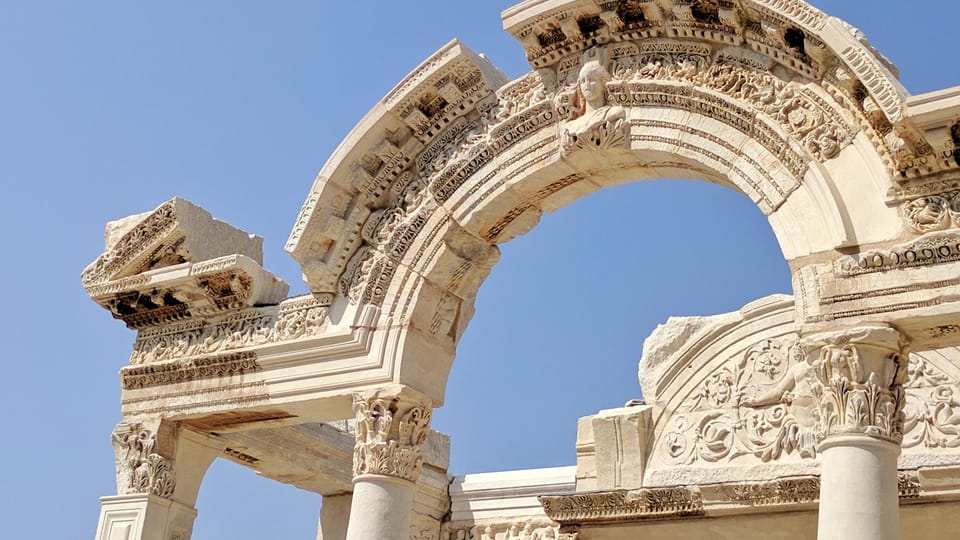Our Greatest Need (Ephesians 1:1-2)

This morning I want to ask you important question. The question is this: what is our church's greatest need? Could it be a new program, or new leaders, or a new vision, or some strategic focus? What one thing could make the greatest positive difference in the life of our church as we begin a new year?
I tried guessing how some of us might answer this question. We have lots of needs. Anicet, our treasurer, could tell you that we need more money. Our children's ministry leaders will tell you that we need more workers. Sandy will tell you that we could use a few more pianists and musicians. The youth will tell you that we need more paintball nights. Dwain, our custodian, might tell you that we need people to turn off the lights when they're done in our building.
Bigger picture, some of us may think that our greatest need is to know what we are going to do in our community. It may be along the lines of clarifying our vision or unifying ourselves around some strategic focus in the coming year.
What is our church's greatest need?
I'd like to suggest that our greatest need isn't our most obvious need. It may not be one that you and I have even thought about. In just a minute I'd like to look at the verses we just read, which look at first like a standard introduction but actually point us to what we need more than anything else.
Let me tell you about Ephesians. It's a little bit intimidating to begin a series on this letter, written by the apostle Paul to the church in Ephesus. This was John Calvin's favorite letter. It's been called "the crown of St. Paul's writings," "the divinest composition of man," "the Grand Canyon of Scripture." It's been called one of the most relevant books for the church today. This is just a sample of what people have said about Ephesians over the years, and they're not exaggerating. So we have both a treat and a challenge ahead of us.
The apostle Paul doesn't waste any time as he begins this letter. As we begin to read chapter 1 we may be tempted to skip over the standard greeting we find in verses 1 and 2. But these verses contain in condensed form some heavy-duty theology. In fact, right in these two verses you have two of the major themes of this entire book. You also have a description of our church's greatest need.
What is our church's greatest need?
First, to understand who we really are.
That's our first need: to understand who we really are. Look at verse 1 with me:
Paul writes, "Paul, an apostle of Christ Jesus by the will of God, To God's holy people in Ephesus, the faithful in Christ Jesus" (Ephesians 1:1).
Take a look around you this morning. Who do you see? You probably see people who are, in many ways, a lot like the recipients of this letter.
When Paul wrote this letter, he wrote to the residents of a rich city, one of the major commercial centers of the area. It was a cosmopolitan and multiethnic city with people from all over the world – all different nationalities and backgrounds. It was a city that believed in tolerance and accommodation. It was also a city that was religiously pluralistic with a belief in the supernatural, but also with lots of opportunity for immorality. It was in a lot of ways like Toronto.
When Paul wrote Ephesians, he was writing to ordinary people who lived in this city: people with financial pressures; people with way too much to do and not enough time; parents with challenging kids and kids with challenging parents. He wrote to people who sang well along with people who can't hold a tune and everyone else in between. In other words, people just like us. And look what he called them: God's holy people (saints), faithful, in Christ Jesus.
Can I tell you what our greatest need is? It's actually this: to understand who we really are in Christ Jesus. In this verse you have a collision of two doctrines: the doctrine of humanity and the doctrine of the church. The doctrine of humanity says that we were created in God's image but sinned and have been kicked out of the Garden, and spend most of our lives muddling through life as ordinary people longing for more. The doctrine of the church says that God has taken these muddling people and made them into a new society, part of his new creation. If you look around you this morning, you see ordinary people living in the real world with real problems. But you also see around you saints, and the faithful in Christ Jesus. Our greatest need is to understand who we really are in Christ.
Can I unpack each of these terms for you so that you know who you – not you individually but you collectively – really are?
You are saints, God's holy people. I know you don't feel like saints. In the Catholic church, a saint is someone who lived an especially exemplary life, and who has been officially recognized by the church after his or her death. But here Paul says that all the people in the church of Ephesus are saints. What does he mean?
Saint actually means holy one, someone who has been set apart for God. It has nothing at all to do with human merit; it has everything to do with God selecting a person who is completely undeserving and sinful; reaches down through the power of the Holy Spirit and regenerates them; and brings them into the company of God's church.
I was digging in my backyard a couple of weeks ago, and found a rusty pulley wheel that used to be at one end of a clothesline in the backyard. It was in terrible condition, all corroded and dirty. Imagine for some reason that I decided to set this rusty wheel aside for myself, and I went to work cleaning it and restoring it to what it was originally designed to be. The minute I chose it, it would be considered set apart, even though it still is rusty and in need of a lot of work.
This is what it means to be set apart for God, his saints and his holy people. You are still corroded and dirty and far from perfect, but God has picked you up and claimed you as his own, and is in the process of restoring you. It is so important that you know this. You ordinary people are God's saints, his treasured people. He has claimed you as his own, and he is in the process of making you new.
Then Paul says that you are also faithful. This could mean one of two things. Faithful could mean that you and I are reliable and trustworthy, but honestly, we know better. I've looked in my own life and found that I am not faithful. I am prone to wander. My confidence is not in myself, because I know that I cannot meet my own standards, never mind God's.
Most commentators think that faithful means having faith. Paul is saying you are those who have faith not in yourselves, but in Jesus Christ and all that he has done for you. Martin Luther wrote, "Did we in our own strength confide, our striving would be losing. Were not the right man on our side, the man of God's own choosing…." You are the faithful, because all of our hope, all of our faith, is not in ourselves, but in Jesus Christ who died for our sins, rose again, and has given us new life. We are the ones who have placed our faith in the gospel. We have heard what God has done for us, and by grace we have believed it.
Then Paul says we are in Christ Jesus. This is one of the most important terms that Paul ever uses. It's an idea that's found nine times in verses 3 to 23 of this chapter. Somebody's counted – Paul used variations of this phrase 164 times in his writings. You need to understand what he means. It's so important.
What does it mean that we are in Christ Jesus? According to Paul, our natural condition is to be in Adam. That means that Adam's record is ours. Because we are sons and daughters of Adam, his sin is our sin. We have inherited his guilt, and we have inherited his sinful nature.
But Paul here says that those who have put their faith in Christ are no longer in Adam; they are in Christ. Christ's record has become our record. His righteousness has become our righteousness. We have inherited a clean record and a new nature from him, and everything that is Christ's is now ours. Although our place is on earth, we have been spiritually lifted with Christ. As Paul says in the next chapter, "God raised us up with Christ and seated us with him in the heavenly realms in Christ Jesus" (Ephesians 2:6).
No matter what your situation is, no matter who you are, if you are a Christian, then you are in Christ. You are joined to him. He is your life. You are not self-reliant or self-sufficient. You find all of your satisfaction and every need met in him. As a result, every blessing belongs to you because of your participation in Christ.
So Paul looks at these ordinary people living in a real place with real problems and says: You are saints. You are faithful; you have put your trust in the gospel. You are in Jesus Christ, so that everything that is his is yours. And our greatest need as a church is to understand, to really understand, who we are: saints, the faithful, the very people of God who are found in Christ Jesus. Our greatest need as a church is that we would really understand this.
Martyn Lloyd-Jones was a medical doctor who became pastor of a small church in Wales at the age of 27. It was a big deal that a medical doctor would give up his career to become a pastor. The church was in decline, and as people waited for Lloyd-Jones to arrive they wondered what he would do. What needs would he identify, and what would he do about them?
Some of his contemporaries changed the church services so that they were more attractive. Others tried to make the preaching more relevant. Some added midweek programs; others focused on children. The pastor who preceded Lloyd-Jones argued that he got more done walking the streets around the church than he accomplished within the walls of the church.
None of these approaches are necessarily bad. I wouldn't argue for unattractive worship services or irrelevant preaching. I'm all for good programs, midweek programs, and ministry outside the walls of this church. But Lloyd-Jones believed that none of these would address the church's primary need. The primary need of the church, he believed, is for the church to understand and represent to the world the true life and privilege of being the children of God. The fundamental need is for the church to remember who she truly is. The most important thing for us is to know that we are not only a collection of ordinary people. We are saints, the faithful. We are in Christ Jesus. When we begin to understand who God has made us to be, it changes everything.
But Paul doesn't end there. Paul wants us to understand one more thing. We need to understand who we are. There's another need.
Second, to understand what God is up to.
In verse 2 we have in miniature form a summary of all that God is up to in this world. The standard greeting in a letter of that day would be words close to the ones that Paul used. Paul made a small change and filled his greeting with theological meaning, telling us what God is up to in this world. Ephesians 1:2 says, "Grace and peace to you from God our Father and the Lord Jesus Christ." In this one line Paul sums up all the gifts that are ours as a result of Christ.
What does this mean? Grace is the free, undeserved favor of God. Grace means that we get God's favor even though we deserve only his judgment. Grace is our only hope before a holy God.
I wasn't at Richview last week. I attended another church, one that practices confession as part of their morning worship. By the time we got to that point in the service I had stopped taking notes about what I could learn from the way they do things, because I realized I had something much bigger to focus on as I read these words with the rest of the congregation:
Our offenses are many in your sight, and our sins testify against us. Our offenses are ever with us, and we acknowledge our iniquities: rebellion and treachery against the LORD. turning our backs on our God, speaking oppression and revolt, uttering lies our hearts have conceived. Help us, O God our Savior, for the glory of your name; deliver us for your name's sake.
At this point I wasn't taking notes. I was busted. I was saying, "This is me." But then the leader reminded us of God's grace: that God had chosen to extend his favor to us, not because we had deserved it, but simply because of his love and mercy and grace. So when Paul says, "Grace to you," that is a very big deal. God is in the business of extending grace to sinners.
Then Paul mentions peace. Again, there's much more than meets the eye. Peace comes from the Hebrew concept of shalom, which is deep well-being and deep prosperity. It's the condition of the world without sin. It's a theme that's going to come up repeatedly in Ephesians. Peace is what God has taken the initiative to do: to reconcile sinners to himself and to each other in his new community. God is in the process of restoring all things, and he's beginning in the church by reconciling people who were enemies of God with himself. He's taking people who were enemies with each other and making them into family.
"Grace and peace" is shorthand for the good news contained in the letter to the Ephesians. This is shorthand for God's cosmic program. It's all that he is up to in this world, and we have the privilege of being part of it.
Paul says, "I want you to understand who you are: saints, the faithful in Christ Jesus. And I want you to understand what God is up to: extending his grace and peace throughout the world." And when we understand this, it will change everything. It will make is humble, because we realize that we didn't deserve any of this. It will make us confident and secure, because we recognize who God has made us in spite of our sin. It will allow us to realize that we are participants in what God is doing in this world. We will become participants in extending his grace and peace to others. When we really understand this, there will be no holding us back. But until we understand this, there will be no getting us going.
So I want to ask you what I did when I started off. What is our church's greatest need? It's actually not more people or more money or more workers or more paintball nights or more strategies, as good as all of those things are. Our greatest need is that we understand who God has made us and what he is doing in this world. When we understand this – really understand this – it changes everything.
"Our thinking about who we are as Christians should not begin with what we can discover about ourselves by self-analysis. Rather, it begins with what God says about those who trust in Christ." (Sinclair Ferguson)
Father, would you allow us to see past our ordinariness to see who we truly are in Christ Jesus. Would it sink deep into our souls, making us humble, confident, and secure.
And may we really understand as we look at Ephesians what you are up to in the world, so that we become participants in what you are doing, extending grace and peace to a world that desperately needs both.
In Jesus' name, Amen.





